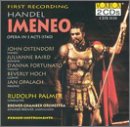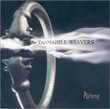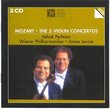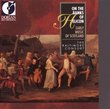| All Artists: George Frideric Handel, Rudolph Palmer, Julianne Baird, Beverly Hoch, Brewer Chamber Orchestra, D'Anna Fortunato, John Ostendorf, Jan Opalach, Edward Brewer Title: Handel - Imeneo / Ostendorf · Baird · Fortunato · Hoch · Opalach · Brewer CO · R. Palmer Members Wishing: 0 Total Copies: 0 Label: Vox (Classical) Release Date: 5/23/1995 Genre: Classical Styles: Opera & Classical Vocal, Historical Periods, Baroque (c.1600-1750) Number of Discs: 2 SwapaCD Credits: 2 UPC: 047163513527 |
Search - George Frideric Handel, Rudolph Palmer, Julianne Baird :: Handel - Imeneo / Ostendorf · Baird · Fortunato · Hoch · Opalach · Brewer CO · R. Palmer
 | George Frideric Handel, Rudolph Palmer, Julianne Baird Handel - Imeneo / Ostendorf · Baird · Fortunato · Hoch · Opalach · Brewer CO · R. Palmer Genre: Classical
|
Larger Image |
CD DetailsSimilarly Requested CDs
|
CD ReviewsAt bargain price this is a must buy David Cloke | London | 11/25/2000 (3 out of 5 stars) "Imeneo was Handel's penultimate opera and, perhaps because of the straightened times he found himself in at this time, is in a lighter style than most of his other operas. Handel himself decribed it as an operetta. Following its failure in London in 1740, Handel took the piece in a revised form and in English, to Dublin for the season that saw the first performance of Messiah. Indeed, there are a couple of pre-echoes of Messiah in Imeneo and also one of contemporaneous Concerti Grossi..The complex performance history means that Imeneo never really found a final form and this recording seems to pick and chose from available alternatives. It also seems to suffer from cuts (despite being billed as the first complete recording), both of pieces but also within pieces.The performance is always at least adequate, with the women being rather better than the men. I particularly enjoy Beverly Hoch's soubrettish Clomiri (some excellent decoration of the repeats) and D'Anna Fortunato's Tirinto. She rather reminds me of Janet Baker, who has sung the part in a broadcast performance. The two men are both a bit gruff, which is fine for the father but less so for the hero, Imeneo. The broadcast performance has a lighter baritone, Stephen Varcoe, which to me seems more appropriate. Nonetheless all the characters have fine arias that show Handel at his best.The Brewer Chamber Orchestra is a good period band but which lacks the weight and intensity that Rene Jacobs, for example, brings to Handel operas. Occasionally the orchestra seems too forward of the singers. Palmer is generally a good and involved conductor, though I found that the recitatives plodded somewhat.However, at a bargain price what quibbles I have are almost irrelevant." Despite Some Fine Singing, No Longer 1st Choice Nicholas A. Deutsch | New York, NY USA | 06/06/2004 (3 out of 5 stars) "Handel's next-to-last Italian opera "Imeneo" (first performed in 1740) is short, has a simple plot - young woman torn between love and duty to her community must choose between 2 men - and modest scenic requirements. If in one sense it's a Handel opera in miniature, the passions run as strong as in any of the bigger pieces. And like the 2 works that flank it, "Serse" and "Deidamia," "Imeneo" has a distinctive tone that combines touches of ironic humor with absolute seriousness. Above all, the score exudes freshness and charm.
Until recently performers have been hampered by the lack of a completely satisfactory text: the old 19th century Handel edition, though it presents numerous alternate versions, provides no guide through the piece's tangled textual history, which includes later interpolations from "Deidamia," "Faramondo" and "Sosarme." Fortunately, the new HHA edition has now appeared, and there's a lively, well-sung recording [CPO 999 951-2] that makes good use of it, presenting Handel's 1740 version uncut. It makes a huge difference to the dramatic shape and effectiveness of the piece, and I recommend that 2-CD set as the current 1st choice for "Imeneo." I have little to add to David Cloke's assessment of this version, except to point out that, even allowing for the lack of a thoroughly reliable edition to work from, many of the textual choices here are poorly judged. As for the 1-CD German-language version on Berlin Classics, it's of historic (1967) interest only: the text has been cut by more than half, the remaining numbers shuffled around, accompaniments have been "filled in" with new string and wind parts, and the role of Tirinto has been dropped from mezzo to tenor. The new CPO version, conducted by Andreas Spering, shows how far German performance practice in Handel has come since then; this Vox version, with some attractive singing, is 2nd choice." |

 Track Listings (6) - Disc #1
Track Listings (6) - Disc #1





